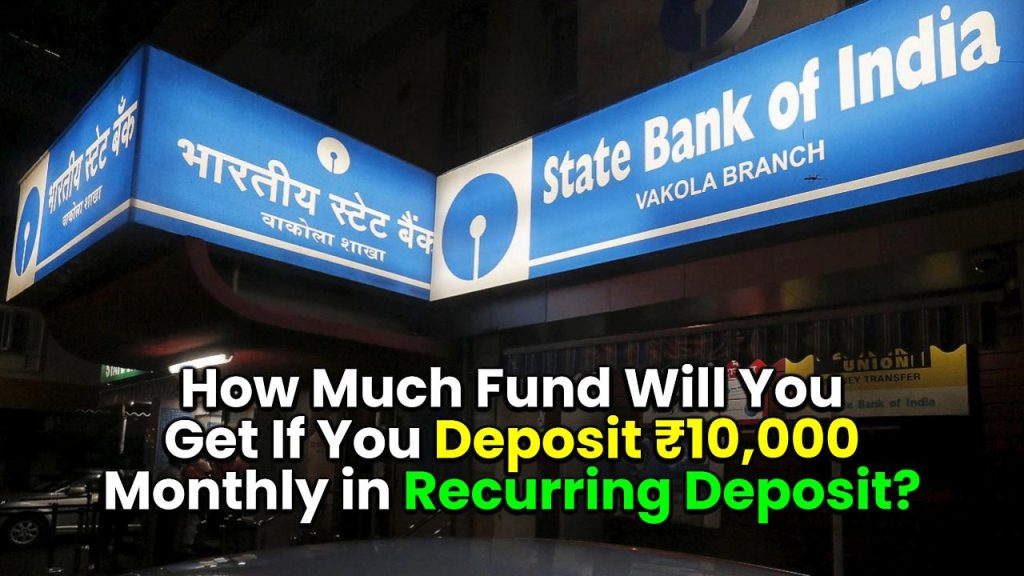
If you’re planning to build a savings habit or create a future fund without taking market risks, the SBI RD Calculator can help you estimate exactly how much you’ll receive by the end of your deposit period. One popular strategy is to deposit ₹10,000 monthly in a Recurring Deposit (RD) account at State Bank of India (SBI). But how much money will you actually get at maturity? Let’s break it down with clear examples and expert advice.
SBI RD Calculator
| Feature | Details |
|---|---|
| Monthly Deposit | ₹10,000 |
| Tenure | 5 years (60 months) |
| Interest Rate | 6.5% p.a. (compounded quarterly) |
| Total Investment | ₹600,000 |
| Estimated Maturity Amount | ₹700,636* |
| Total Interest Earned | ₹100,636 |
| Type | Fixed-income, low-risk deposit |
The SBI RD Calculator is a powerful tool to plan your finances without risk. By depositing just ₹10,000 monthly, you can accumulate over ₹700,000 in 5 years with peace of mind and guaranteed returns. Whether you’re saving for a short-term goal or long-term security, SBI’s recurring deposit is like a financial SIP — only safer.
What is an SBI RD and Why Is It Like a SIP?
A Recurring Deposit (RD) is a type of term deposit where you deposit a fixed amount every month, just like a Systematic Investment Plan (SIP) in mutual funds. The key difference? An RD offers guaranteed returns because the interest rate is fixed and not affected by market fluctuations. It’s perfect for people who want:
- Safe and steady returns
- Disciplined monthly savings
- No market-linked risk
As of March 2025, SBI offers RD interest rates ranging from 6.5% to 7.0%, depending on the deposit tenure and the age of the depositor.
see also: These Schemes of Post Office Will Be Useful for Saving Money, You Will Get Huge Returns
How Does the SBI RD Work?
When you open an SBI RD account, you choose a fixed monthly deposit amount (in our example, ₹10,000) and a tenure (e.g., 1 to 10 years). SBI adds interest to your account every quarter.
Interest Calculation Formula
The RD maturity amount is calculated using the formula:
M = R × ((1 + i)^n – 1) / (1 – (1 + i)^(-1/3))
Where:
- M = Maturity amount
- R = Monthly deposit
- i = Interest rate per quarter divided by 3
- n = Total number of quarters
Let’s simplify it. You deposit ₹10,000 monthly for 5 years at 6.5% interest. Over 60 months, your investment becomes ₹600,000. With interest, you get approximately ₹700,636 back.
SBI RD Calculator: A Step-by-Step Guide
Here’s how you can calculate your returns using the SBI RD Calculator online:
Step 1 – Visit the SBI Official Website
Go to SBI RD Calculator Page for real-time tools.
Step 2 – Enter Key Details
- Monthly Deposit: ₹10,000
- Tenure: 5 years
- Interest Rate: 6.5% (or current rate applicable)
Step 3 – View Results
The calculator will automatically show your maturity amount and interest earned. This helps in planning your goals like:
- Child’s education
- Emergency fund
- Travel fund
- Wedding savings
SBI RD vs SIP: Which One Should You Choose?
While both promote monthly savings, the difference lies in risk and return.
| Feature | SBI RD | SIP in Mutual Fund |
|---|---|---|
| Returns | Fixed (6.5-7%) | Market-linked (8-15% avg) |
| Risk | Low | Moderate to High |
| Liquidity | Premature withdrawal allowed with penalty | High liquidity |
| Ideal For | Conservative investors | Growth-seeking investors |
Expert Tip: If you want guaranteed savings and can’t tolerate market ups and downs, SBI RD is your best friend. If you’re aiming for higher returns over the long run and can handle risk, SIPs might suit you better.
Important Things to Know Before Opening an SBI RD
- Minimum monthly deposit: ₹100
- Maximum tenure: 10 years
- Interest compounding: Quarterly
- Premature closure: Allowed, but interest is paid at 1% lower than applicable rate
- Taxability: Interest is taxable under your income slab
- TDS: Applicable if interest exceeds ₹40,000 in a year (for non-senior citizens)
Senior Citizens Get Higher Rates
If you’re above 60, SBI offers around 0.5% higher interest, which means even better returns.
see also: EPFO Money Up to Rs 1 Lakh Can Be Withdrawn Through UPI
SBI RD Calculator FAQs
Q. Is SBI RD better than Fixed Deposit?
RD is ideal if you want to save monthly. FD is better if you have a lump sum. Both are safe and offer similar interest rates.
Q. Can I change the monthly RD amount later?
No, the deposit amount is fixed at the time of opening. For flexibility, you’d have to start a new RD account.
Q. Is RD interest taxable?
Yes, RD interest is fully taxable as per your income tax slab. TDS is also applicable.
Q. Can I take a loan against my RD?
Yes, SBI allows loans against your RD up to 90% of its value.











